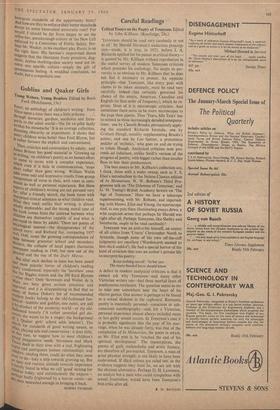Careful Readings
Critical Essays on the Poetry of Tennyson. Edited by John Kiliham. (Routledge, 28s.) 'TENNYSON should be read very carelessly or not at all.' Sir Harold Nicolson's audacious prescrip- tion—made, it is true, in 1923, before I. A. Richards applied for his patent in critical theory— is quoted by Mr. Kiliham without reprobation in the useful survey of modern Tennyson criticism which precedes his anthology. No doubt its per- versity is so obvious to Mr. Kiliham that he does not feel it necessary to protest. An opposite principle—that Tennyson, like every poet with claims to be taken seriously, must be read very carefully indeed—has certainly governed his choice of the essays, American, Canadian and English (in that order of frequency), which he re- prints. Most of it is microscopic criticism. And sometimes there seem to be more microscopes to the page than poems. Thus 'Tears, Idle Tears' has to submit to three increasingly detailed interpreta- tions : one by Cleanth Brooks, persuasively apply- ing the standard Richards formula; one by Graham Hough, sensibly supplementing Brooks's points; and one by Leo Spitzer, a pretentious peddler of 'stylistics,' who goes on and on trying to refute Hough. Analytical criticism now pro- ceeds ad infinitum, unlike Swift's version of the progress of poetry, with bigger rather than smaller fleas to bite their predecessors.
The best essays in Mr. Killham's collection are, I think, those with a wider sweep, such as T. S. Eliot's introduction to the Nelson Classics edition of In Memoriam. W. W. Robson's Third Pro- gramme talk on 'The Dilemma of Tennyson,' and G. M. Young's British Academy lecture on 'The Age of Tennyson.' Here we have a telescope supplementing, with Mr. Robson, and supersed- ing, with Messrs. Eliot and Young, the microscope. And, as one puts these illuminating essays down, a wild suspicion arises that perhaps Sir Harold was right after all. Perhaps Tennyson, like Shelley and Swinburne, ought to be read carelessly?
Tennyson was an anti-critic himself, an enemy of all critics from 'Crusty' Christopher North to Aristotle, though some of his own off-the-cuff judgments are excellent ('Wordsworth seemed to him thick-ankled). He had a special horror of the kind of criticism that uses an author's private life to interpret his poetry : Keep nothing sacred : 'tis but just
The many-headed beast should know.
A defect in modern analytical criticism is that it cannot ask why Tennyson—and many other Victorian writers too—had these morbid fears of posthumous revelation. The question seems to me to take one somewhere near the heart of his elusive genius. One answer is perhaps to be found in a sexual skeleton in the cupboard. Romantic poetry is essentially personal—conscious or sub- conscious autobiography—and, for a Victorian, personal experience almost always included more or less guilty sexual secrets. In Tennyson's case it is probably significant that the year of his mar- riage, when he was already forty, was that of the completion of In Memoriam, the poem in which, as Mr. Eliot puts it, he 'reached the end of his spiritual development.' The masterpieces, the poems of guilt, melancholia and orotic fantasy, are therefore all pre-marital. Tennyson, a man of great physical strength, is not likely to have been undersexed. If illicit unions are ruled out, as the evidence suggests they must be, we are left with the obvious alternative. Perhaps D. H. Lawrence, no analyst but a man who could sympathise with sexual frustration, would have been Tennyson's best critic after all.
P. W. BATESON






































 Previous page
Previous page